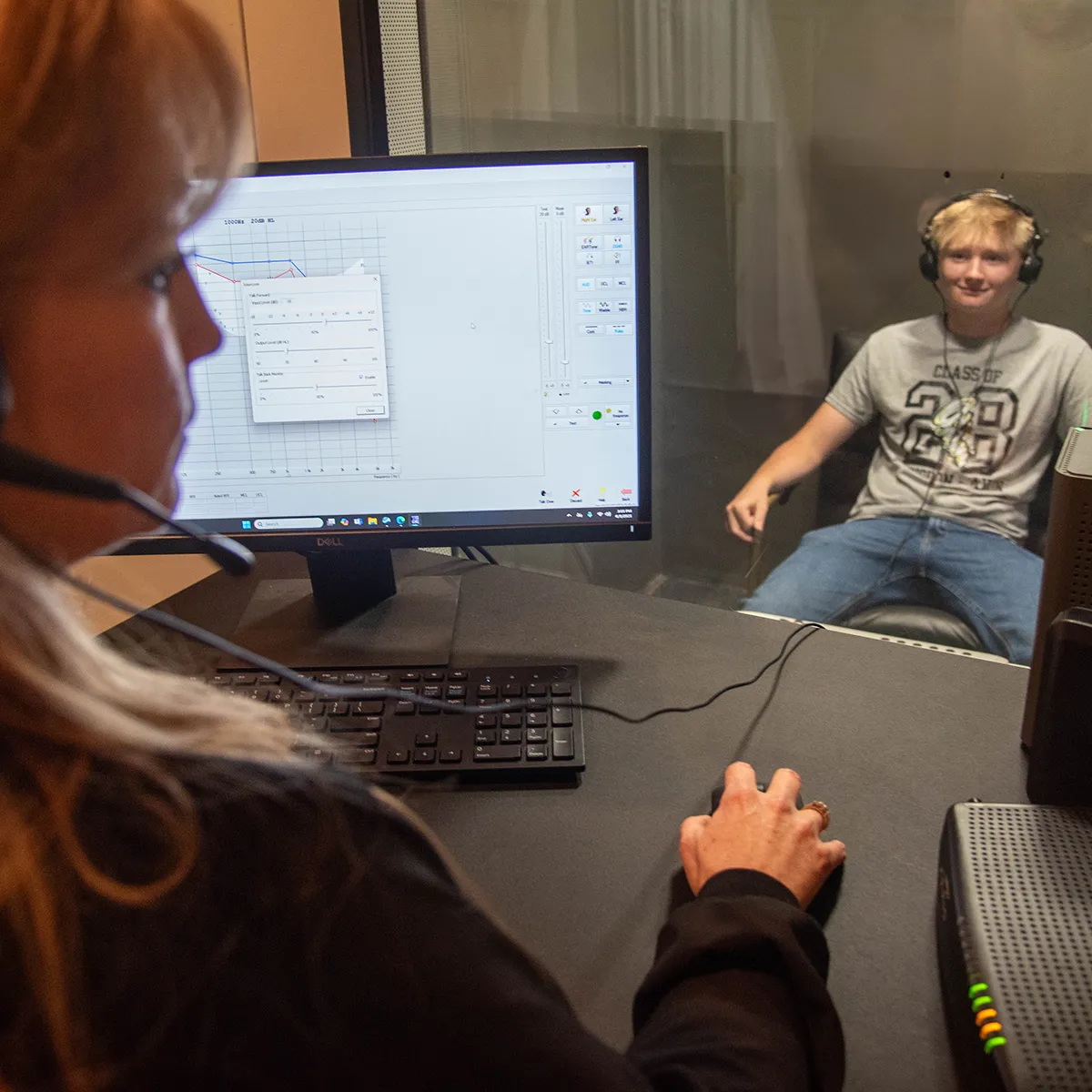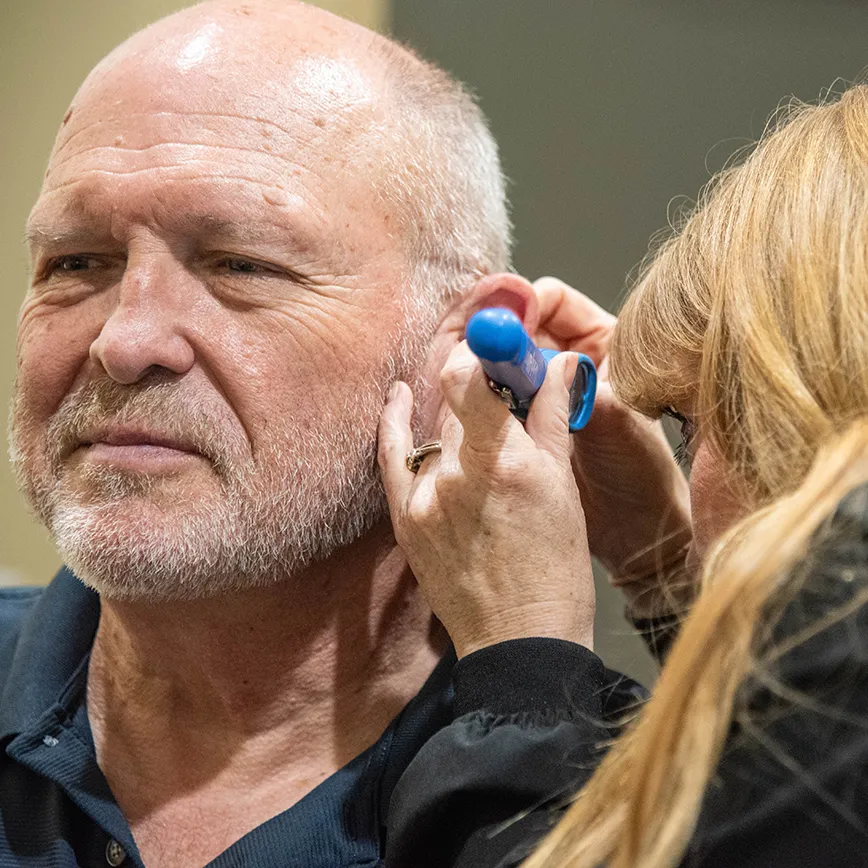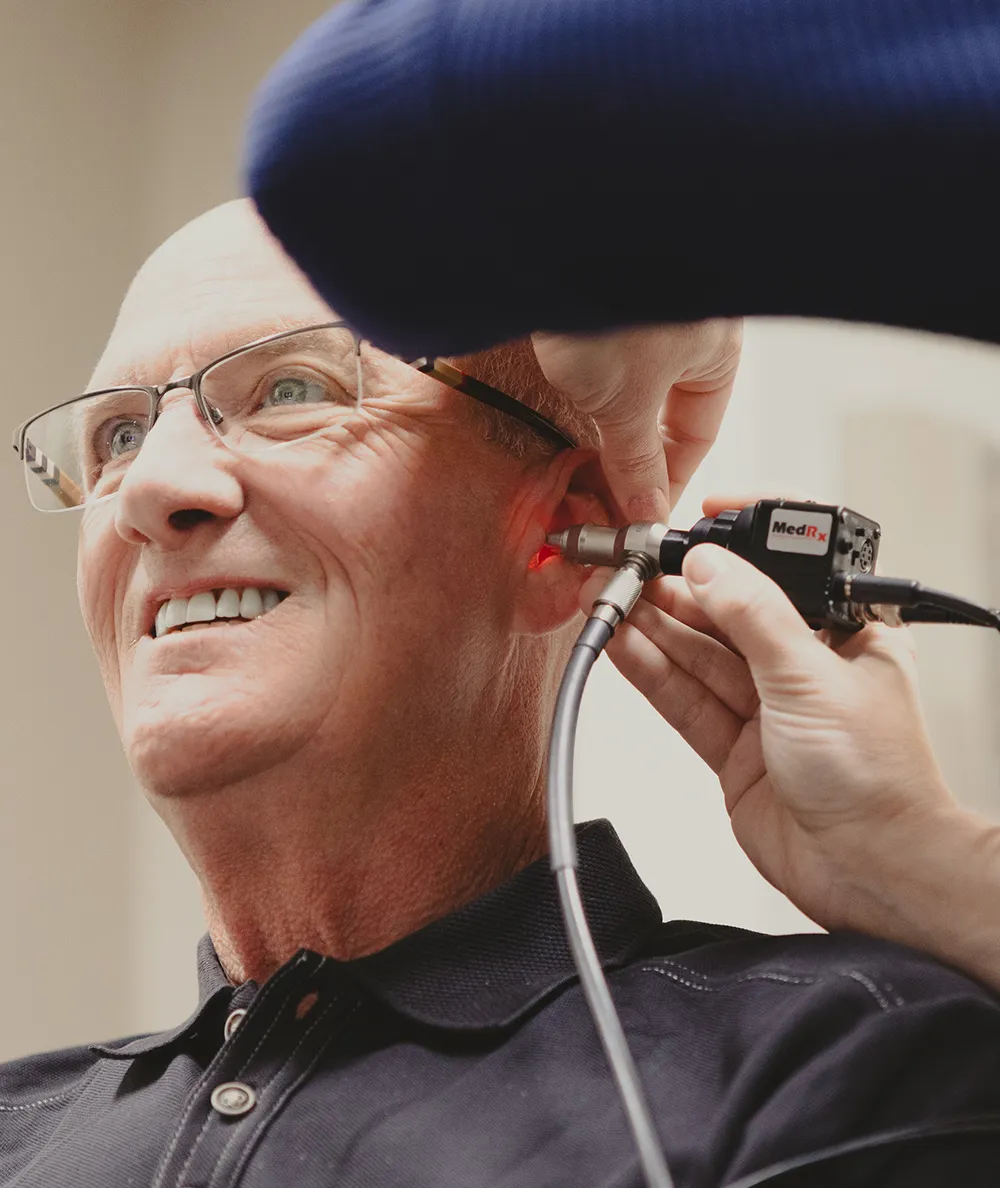Hearing Loss
Hearing loss disconnects you from the people and things you love. Even a mild hearing impairment can result in asking people to repeat themselves, straining to hear on the phone or in background noise.

The Connection Between Hearing Loss and Mental Health
Hearing health is very closely tied to mental health. It's true! The connection between how we hear strengthens our bond with others and feeds a part of our brain like exercise builds our muscles. Hearing loss results in a poorer quality of life and can contribute to cognitive decline.
You've heard how crossword puzzles help keep you sharp, how about a baseline hearing test to check up on your hearing health? Your brain (and loved ones) will thank you!
Depression
Uncorrected hearing loss gives rise to poorer quality of life, isolation and reduced social activity, leading to depression.
Isolation
Adults 50 years and older with untreated hearing loss are more likely to report depression, anxiety, anger and frustration, emotional instability and paranoia; than those who wear hearing aids.
Cognitive Decline
Those with hearing loss experience a 30-40% greater decline in thinking abilities compared to those without hearing loss.

Causes of Hearing Loss
Hearing loss can stem from many different sources, affecting people of all ages.
Natural aging causes gradual deterioration of inner ear hair cells, while noise exposure from sudden loud sounds or prolonged moderate noise can cause permanent damage.
Medical conditions like Meniere's disease and otosclerosis affect hearing function, and some medications (ototoxic drugs) can harm hearing structures.
Physical trauma to the ear or head can disrupt delicate hearing mechanisms, while ear infections, excessive earwax, and genetic factors can all contribute to hearing loss.
Types of Hearing Loss
Hearing loss is classified by which part of the auditory system is affected, with each type requiring different treatment approaches. Understanding the specific type of hearing loss you have is crucial for determining the most effective treatment plan and rehabilitation strategy for your unique situation.
The most common type of hearing loss is the result of damage to the delicate hair cells in the inner-ear organ of hearing (the cochlea) that organize and transmit sound to the brain. When these hair cells, or the nerves they connect to, are damaged; the result is difficulty understanding. Nearly 95% of adult cases of hearing loss are sensorineural in nature. The only treatment for sensorineural hearing loss is amplification through a hearing aid or in rarer cases, a cochlear implant.
This type of hearing loss occurs as the result of an infection or blockage in the outer or middle ear. Otitis media (middle-ear infections) can sometimes cause difficulty hearing due to a fluid buildup. Otitis externa (swimmer’s ear) or a buildup of earwax may create a blockage outside the eardrum. This type of hearing loss is typically reversible once the infection or blockage clears, or once necessary surgery is performed. A referral to an Ear Nose and Throat (ENT) specialist is recommended in the event of a diagnosis of conductive hearing loss. Approximately 5% of adults have a conductive type of hearing loss.
A mixed hearing loss typically refers to a combination of a conductive hearing loss and a sensorineural hearing loss. A condition effecting the ossicles of the middle ear (tiny bones that conduct sound) is a common example of a mixed hearing loss. Hearing may improve after the conductive portion of the hearing loss is resolved through treatment or surgery; however, the sensorineural component of the hearing loss is permanent.
A sudden loss in hearing, either entirely or partially, within a 24-hour period is a medical emergency. While sudden hearing loss is rare, it’s possible that hearing may never return without immediate medical attention. Treatment is administered by a physician and may include steroids to support the recovery of hearing. Not sure where to go? Call our office and we can help.
Noise-Induced Hearing Loss (NIHL) is hearing loss that is caused by exposure to hazardous noise suddenly or for extended periods of time.
Those most at risk for NIHL include those whose job has exposure to hazardous noise:
- Factory workers
- Construction workers
- Farmers
- Musicians
Additionally, those with loud hobbies, such as lawn mowing, playing recreational music, attending concerts, hunting, or working with power tools may experience NIHL.
Symptoms may include sensitivity to everyday sounds (Hyperacusis), difficulty hearing, or ringing or noises in the ears (Tinnitus). Results are confirmed on a full hearing evaluation, where a “notch” is noted at specific frequencies of the hearing test. The prevalence of NIHL has increased in recent years, where the exposure of loud music through headphones or earbuds has become more frequent, especially in teenagers and young adults. Staying informed about hazardous noise and hearing protection can help prevent Noise-Induced Hearing Loss across the lifespan.
Addressing your hearing loss has many advantages
The ear is the most efficient, and at the same time, the most sensitive sensory organ of human beings. Our perception of the world is strongly influenced by visual stimuli, which is why we often underestimate the role of our ears.
Improved confidence
Slow down cognitive decline
Improved emotional and physical health
Reduced listening effort
Improved communication in relationships
Reduced mental stress
Increase your earning power
Improve your fall risk
Reduce annoyance related to tinnitus
Decreased incidence of depression

Our Hearing Care Approach
At your first appointment, our audiologist or hearing instrument specialist will do a full case history to help determine the source of your hearing loss or tinnitus. A full diagnostic hearing evaluation will assess your hearing ability. Further testing and questionnaires will determine how your auditory condition affects your quality of life. These assessments are selected based on your needs. We will discuss your test results and recommendations for treatment.
Due to the different sources that may cause hearing loss or tinnitus, some conditions may require management or treatment by outside professionals. Some hearing disorders are temporary and require immediate medical attention. Our audiologist or hearing instrument specialist will follow the recommended protocol to help guide you through possible forms of relief and whether further medical attention is warranted.
